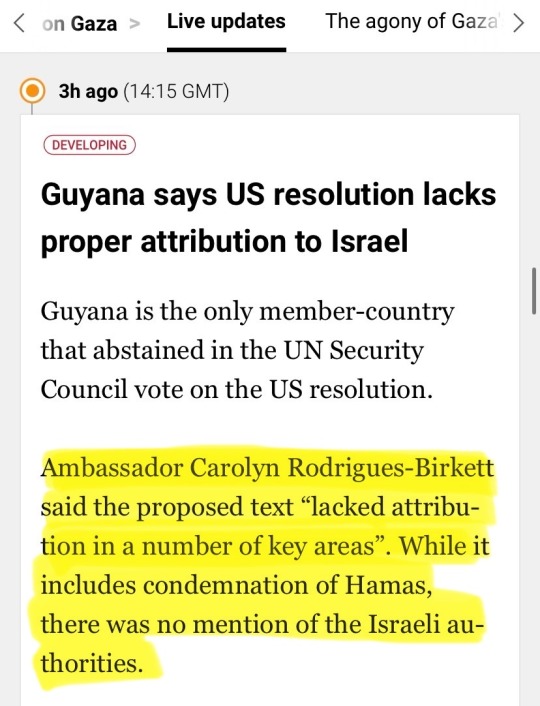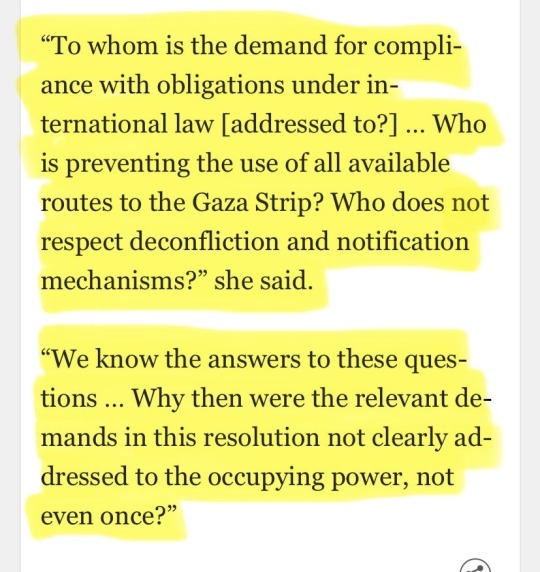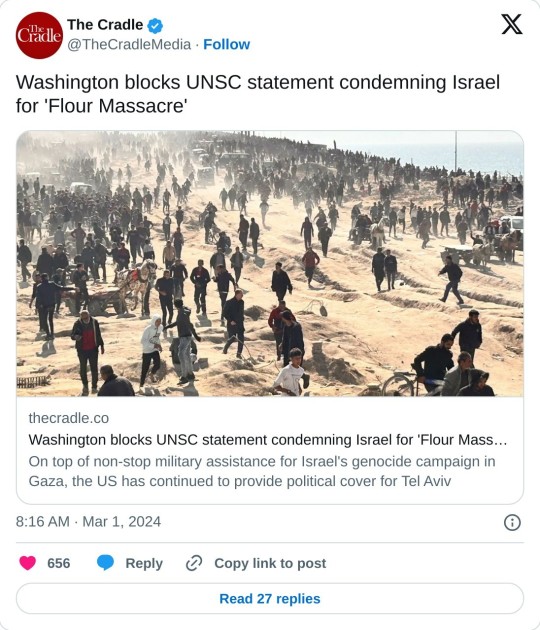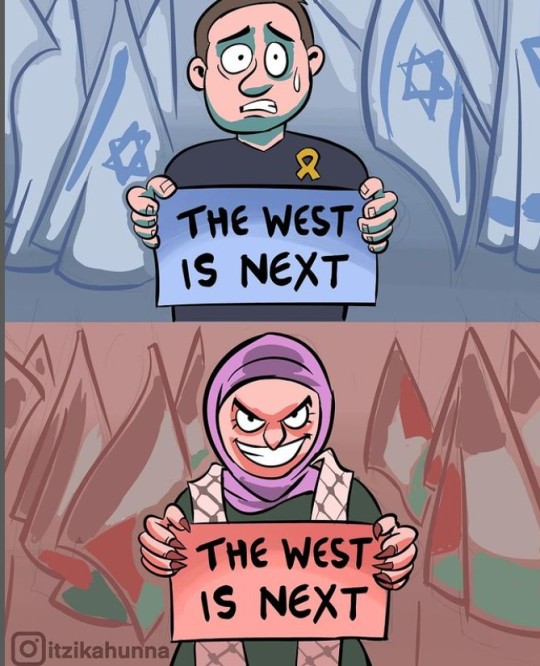#stop vetoing ceasefires
Explore tagged Tumblr posts
Text
HOT TAKE IT SHOULDN'T BE POSSIBLE TO VETO A CEASEFIRE AND ANY COUNTRY THAT TRIES SHOULD BE BULLIED MERCILESSLY
#what the fuck America#this is the third time#get your heads out of your asses#stop vetoing ceasefires#this is a genocide#what the fuck happened to never again#demand a ceasefire#ceasefire now#ceasefire#i stand with palestine#justice for palestine#support gaza#do your daily clicks#eyes on palestine
140 notes
·
View notes
Text


Guyana literally went:

#guyana#united nations#unsc#free palestine#palestine#gaza#free gaza#israel#current events#world politics#us politics#gaza genocide#israel is committing genocide#permanent ceasefire now#ceasefire now#ceasefire#world news#us news#usa are supporting genocide#usa#usa news#veto#vote#abstain#stop killing children#stop bombing gaza#stop israel#palestine news#israel news#gaza news
73 notes
·
View notes
Text
Time to END USA Veto!
If we want a total ceasefire, we need to expel USA from UN. Please sign these petitions guys!
#ceasefire now#free gaza#free palestine#i stand with palestine#ceasefire#palestine#air drop aid for gaza#feed north gaza#keep eyes on rafah#all eyes on rafah#expel usa from un#invoke article 6#stop gaza genocide#stop genocide#🍉#فلسطين 🇵🇸#end usa veto#open rafah crossing#boycott israel#sanction israel#gaza
23 notes
·
View notes
Text
instagram
#palestine#gaza#free palestine#free gaza#israel#usa#un#us veto#veto#United nations#ceasefire now#permanent ceasefire#save gaza#save rafah#stop the displacement#dont forget the west bank#absolutely disgusting#Instagram
4 notes
·
View notes
Text

The US, on 29 February, vetoed a UN Security Council (UNSC) statement that would have condemned Israel for the mass murder of over 100 Palestinian civilians who were awaiting the delivery of humanitarian aid in Gaza City. “We don’t have all the facts on the ground – that’s the problem,” US deputy ambassador to the UN Robert Wood told reporters on Thursday. He then claimed there are “contradictory reports” about the Israeli army's latest massacre and highlighted that Washington was focused on finding “some language that everyone can agree on.” Thursday's veto is the fifth time Washington has blocked a UNSC statement or ceasefire resolution that would hold Israel accountable for the atrocities it has committed in Gaza.
#yemen#jerusalem#tel aviv#current events#palestine#free palestine#gaza#free gaza#news on gaza#palestine news#news update#war news#war on gaza#genocide joe#united nations#united nations security council#joe biden#gaza genocide#genocide
22K notes
·
View notes
Text

tags update: rafah is 8th on trending
edit: it is now at 7th
FOR CONTEXT:
israel has launched an invasion and heavy bombing of rafah(a.k.a the "safe zone" 1.7 million Palestinians were forced into) after the UN approved a ceasefire resolution for the rest of ramadan... all 2 weeks of it. results were 14 votes for YESes. 0 NOs. and 1 didn't vote(take a guess who it was) the resolution called for an unconditional release of all hostages on both sides. so yes, mr "i am totally just doing this to get my hostages back whom i totally care about and totally didn't kill" Israel is launching harder attacks even after being promised all hostages release. just in case anyone was still questioning if Israel was using hostages as just an excuse for colonialism
russia tried to turn it into a permanent ceasefire but the US vetoed it. i guess vetoing a ceasefire looks less bad when russia is the one proposing it
DON'T STOP TALKING ABOUT PALESTINE
#also bibi cancelled his visit to the US because of this... Oh ThE TraGeDy#i read about the resolution and was like “huh i wonder how long it will take israel to break it”#i didn't even have time to post THAT and they already did it#yemen#jerusalem#tel aviv#current events#palestine#free palestine#gaza#free gaza#news on gaza#palestine news#news update#war news#war on gaza#settler colonialism#genocide#gaza genocide#Gaza port#rafah
3K notes
·
View notes
Text
biden could have called for a ceasefire months ago. let it be known now and forever : america is no hero. we all watched the us veto every single appeal to stop the barbaric slaughter of innocent lives. but it only took three foreign nationals, three white people, and not the 30,000+ Palestinian lives gone...
edit : 6 white adults. not the 15000+ Palestinian children.
#current events#palestine#gaza#gaza genocide#gaza strip#gaza under attack#gaza under genocide#free palestine#free gaza#genocide
3K notes
·
View notes
Text

From the river to the sea, Palestine will be free 🍉
I’ve seen many people stop boycotting and stop talking about Palestine and it truly breaks my heart especially when the USA recently vetoed the ceasefire, no one should look the other way when this genocide is taking place, don’t stop talking about this don’t stop boycotting.
This blog does not support genocide.
442 notes
·
View notes
Text
Many on the right have sought to depict the protesters as extremists, but the sheer scale and regularity of the protests and actions are in fact a sign of how mainstream pro-Palestinian feeling is within British society. The question, assuming the movement succeeds in ending the Israeli assault, is where does it go next? What becomes of movements when they stop moving? Traditionally, social movements went through phases of emergence, coalescence, institutionalisation and decline, followed by dissipation and co-optation by mainstream parties. This usually took decades, the classic case being the US civil rights movement. Yet the era since “Occupy Wall Street” in 2011 has been one of so-called “flash movements”. From Black Lives Matter to the gilets jaunes, movements have coalesced around hashtagged slogans with astonishing celerity, producing deep political crises – and then subsiding. The Gaza campaign resembles a flash movement. It didn’t come out of nowhere. Palestine has been a cause of the international left since the six-day war in 1967, and the UK has seen repeated protests over Israel’s flattening of the West Bank, invasion of Lebanon and serial bombardments of Gaza. There is a network of organisations doing the groundwork, such as the Palestine Solidarity Campaign and Stop the War. But the turnout for these protests shows the virtues of the flash movement: it can rapidly mobilise masses of people, tolerate a diversity of tactics and keep focus on a simple, morally obvious demand. In many respects, it is succeeding. In the UK, despite efforts to demonise the protests as “hate marches”, and the then home secretary Suella Braverman’s inept provocation of the far right against the protests, the demonstrations brought up to 800,000 people to the streets on 11 November. This was the largest such demonstration since the invasion of Iraq. Nor was the UK alone. There have been mass protests everywhere from Tokyo and Kerala to Cairo, Washington DC and Rio de Janeiro. In France and Berlin, protesters have defied official bans. In the US, the Jewish left has led the movement and often engaged in the most militant tactics,including blockading Manhattan Bridge. The embattled Israeli left has also staged protests, despite a climate of police repression and mob violence. The movement has done what successful movements do: win over public opinion, catalyse cracks in elite consensus and expose divisions in the state. These splits were visible in the form of staffer dissent in the US state department, frontbench resignations in Labour over Keir Starmer’s refusal to support a ceasefire, protests by Dutch civil servants and EU employees, Macron’s ceasefire demand, and recently the call from Canada, Australia and New Zealand, three of the Five Eyes intelligence-sharing coalition countries, for an “immediate humanitarian ceasefire”. Only the US now vetoes UN ceasefire resolutions.
128 notes
·
View notes
Text
Liberals keep saying that we should vote for Democrats because they'll be easier to move, but have y'all been paying attention???????? A year of genocide and a year of protests and wheres the change in position???????????? When are they going to move?? If Democrats win they'll learn they can do anything and still get reelected as long as they have someone they can tell you to be more afraid of. Do you think this is going to be the last election with a candidate like trump???? It's never going to end. After trump they'll replace him with someone who's the same or worse, will you keep supporting genocide as long as you're afraid????
You say that the Democrats are more likely to listen and change position but it's been a year and they're still funding genocide and vetoing ceasefire resolutions at the UN and defending Israel every chance they get. You've bought into lies if you think they're more likely to change position, more likely to listen than Republicans. There is no democracy to be saved if you can't even decide what your tax money gets spent on, if you can't even get your government to stop a genocide despite a year of protests. There is no democracy to be saved today, there never has been
34 notes
·
View notes
Text

WHY IS ISRAEL CONSIDERING A CEASEFIRE WITH LEBANON WHILE HEZBOLLAH IS BOMBING ISRAEL?
Because America.
ARMS EMBARGO
Because the administration has imposed an ARMS EMBARGO on us that not only bars us from receiving the AMMUNITION they are also withholding 130 D9 Caterpillars(!!) needed for removing the terror infrastructure.
Because of this, our soldiers have to go into booby-trapped buildings in order to destroy the terrorists and remove the terror tunnels and weapons caches. Because of this many, way too many of our best have been killed.
Our soldiers are dying because of American policy.
INTERNATIONAL THREATS
Because the administration is not using the weight of America to veto dangerous international resolutions designed to force Israel to surrender in this existential war – something we cannot do if we want to survive.
The first case of this was the International Criminal Court’s decision to issue arrest warrants for Prime Minister Netanyahu and former Defense Minister Yoav Gallant for the crime of genocide. Facts be damned, it doesn’t matter that Gazans are drowning in food, that Hamas is getting rich off the aid being sent into the strip, that our hostages are in Gaza, starving, or that no nation under attack can be obligated to feed the people trying to murder them. Jews are bad, the Jewish State is bad and the American administration said “Oopsie, sorry we didn’t prevent that. We think it’s not nice what they did…”
Next, Israel is anticipating a UN resolution demanding Israel stop the war in Gaza and withdraw. That means leaving Hamas in power and making it possible for them to invade again, as they have promised to do. As the UN is completely against Israel, should the US administration choose not to veto that resolution, it will pass.
THE WAR IS NOWHERE NEAR OVER AND YET WE ARE FORCED TO CONSIDER A CEASEFIRE BECAUSE OF AMERICA.
Americans don’t need to care about defending Israel for the sake of Israel. Americans need to care because the same people attacking us are coming for you next.
Forest Rain Marcia
33 notes
·
View notes
Text
Calls for Action, Call Your Reps: 2/21/24
This is USA-specific, as that is the place I live and know.
Find your elected officials.
There are no bills scheduled to be on the floor on the House or Senate this week, though that may change. The chambers are using this time to debate and negotiate changes to the bills that were passed in the other chamber last week.
Suggested verbiage and strategies for calling your elected officials.
Both House and Senate:
Reinstate funding for UNRWA. While the claims made by Israel that employees of the relief agency were involved in Oct. 7th are troubling, THEY are not well supported, and western officials did not do their duty in investigating the claims before cutting funding. This arm of the UN is currently providing food, water, shelter, and medical care to the 2.3 million displaced peoples of Gaza. It is especially disturbing and concerning that the many children of Gaza, who are already suffering due to this conflict, are now having this support revoked. Many sources are also claiming that the evidence is flimsy at best.
UNICEF is reporting that children are dying of hunger in Gaza, as of today (2/21/24).
Urge both Senate and House to refrain from funding Israel, or to at least put some strings on it. The IDF cannot be given funding without some regulations on what they can do with it. They have proven that they are unwilling to take steps to protect civilians.
Sanctions must also be placed on Israel for its continued impediment of aid intended for Gazans, including aid from the US.
Urge for the US to stop vetoing ceasefire demands in the UN. No, the suggested replacement written by the US is not an excuse.
FOR THE SENATE: Urge your senator to put their support behind Bernie Sanders and his motion to restrict funding to Israel until a humanitarian review of the IDF’s actions in Gaza has been completed. Cite it as Senate Resolution 504 if your Senator is right-wing enough to react negatively to the mention of Sanders by name. NOTE: This resolution was TABLED by the Senate on 1/16, but it is being brought back in as conditions continue to escalate.
Passed in the House last week, so bother your senators about it, is H.R. 3016: IGO Anti-Boycott Act. Vote Nay. This appears to be intended to force US companies to do business with US allies instead of participating in boycotts. This appears, to me, to be an attack on movements like BDS. To Dem Reps, argue that this refuses the right of peaceful protest to US citizens. To Republican Reps, argue that this is a dangerous government overreach and that it is not the right of the government to force US citizens to purchase products and materials from specific foreign partners.
Not related to Gaza: It looks like they're gearing up for another push at KOSA. The canned email responses I'm getting are really proud of being FOR KOSA, which is... bad. VOTE NAY.
FOR THE HOUSE: Urge your representative to put their support behind Rep. Rashida Tlaib’s petition for the US government to recognize the IDF’s actions in Gaza as ethnic cleansing and forced displacement, and put a stop to it. ALTERNATELY: recommend that they support House Resolution 786, introduced by Rep. Cori Bush, Calling for an immediate deescalation and cease-fire in Israel and occupied Palestine.
If you wish to support my political blogging, I am accepting donations on ko-fi.
108 notes
·
View notes
Text
now before i say what i want to say: i hate trump he is fucking evil and i hope he doesnt win
with that said: if biden does in fact lose this election the democrats have absolutely no one to blame but their fucking selves. we saw their true colors, especially biden. they ALL had the chance to stop what was happening in palestine and REPEATEDLY choose not to. all the "we're actually vewy mad at israel >:c" shit was just a performance and nothing more. they still provided the weapons and vetoed so many votes for a ceasefire. fuck the democratic party. fuck biden. fuck america
75 notes
·
View notes
Text
Anyway. You’ll see news about the Biden administration wanting to build high speed rail and have a tax credit for new housing. Today, the US singlehandedly vetoed a UN resolution calling for an immediate ceasefire in Gaza. Seventeen thousand people are dead, which is an equivalent death toll to what would’ve happened if you dropped a nuke on the town where I went to college and killed everyone there.
I genuinely do not care who you actually intend to vote for in the next election as long as you’re aware that “vote blue no matter who” rhetoric right now compromises maybe your only piece of leverage in the electoral system. There’s no incentive for politicians to do what you want them to if you are also, simultaneously, loudly reassuring everyone that you will vote for them regardless. And before you say it no I don’t think any Republican is a “better” candidate and no I don’t think there is a viable non-Biden candidate for president. I just think if you care about Palestinian lives, you should at least learn how to bluff a little better, at the very least until the current president stops actively funding a genocide.
126 notes
·
View notes
Note
Can you explain Palestine vs Israel. I have done my own research and still do not understand. From my understanding Palestine attacked Israel first, and this war has been going on for so much longer than just now. So why is it suddenly so important and how is Israel in the wrong?? Genuinely trying to understand since you are spreading news of the Genocide on your page.
hey so i cant really explain all the complexities and details in a singular tumblr post. i dont really know how much research you did if october 7th is your earliest knowledge of ‘attack.’ israel has been an apartheid state since 1948 and during that year they were downright deplorable to palestinians to get them to be conpliant. nakba is probably the most notorious case but there is more.
this issue is important because this is the first time we see such atrocities in mainstream media and online. Its so oversaturated with suffering that it sets a precedent for how the world (the general public in particular) reacts outside of politicians and activists. will we continue to care when we see other people suffer, or will we grow numb and desensitised? it’s important we don’t lose our humanity like capitalist neoliberalism would prefer. just because we live comfortable lives, it doesnt mean we should be ignorant to those who are suffering. in fact, we should inspect ourselves and ask whether their suffering lends to our comfort and vice versa (it usually does). for instance, many western countries are profiting from this apartheid, hence their support.
i’m not going to list through everything (plus i myself don’t know everything) but i can tell you where to go, and hopefully some others can add on to it.
for israel’s crimes against palestine since october 7th on the account of genocide i feel like south africa has done an amazing job putting together documentations of evidence against them in the ICC. you can find the full thing on youtube or online. some of the crimes include bombing and stopping aid trucks from reaching gaza, preventing women from giving birth by bombing maternity wards, bombing hospitals (there are now 0 active hospitals in gaza, whereas before october there were 36. this info has not been updated in the case) to prevent civilians from getting life-saving treatment, psychologically tormenting civilians until they lose the will to live (particularly in children), and so on.
of course please pay attention to palestinian journalists within gaza specifically— they will show you firsthand whats happening. there’s many apart of al jazeera. al jazeera has also done some articles on the history for you. here is one on nakba. amnesty also did a good job on explaining what an apartheid is.
theres also quite a few independent ones that have become journalists through this attack from israel. bisan is one of them if youre active on tiktok. noor harazeen is a journalist on instagram.
here is a link on how israel funded hamas to rival the plo
here is al jazeeras article on the cultural genocide of palestinians through bombing ancient historical sites and artefacts.
kind of seperate to all that but still related is how support for palestine affects other people. people are losing the jobs over supporting palestine (such as melissa barrera in scream). yemen, another third world country who has been going through crises such as food insecurity for years, has been suspended aid by the UN because it has been aiding palestine throughout the conflict.
The UN in general has been useless about calling for a ceasefire. The United States vetoed during a UNSC meeting because the USA sucks ass. you can look any of this up and they will come with multiple sources im just too tired to find something rn (i’m currently on vacay and heavily sleep deprived).
also general advice to not ask a percy jackson account but an account dedicated to spreading information on the palestine-israel apartheid because they would be able to help you more. yes, ive talked about it on this account but that doesnt mean i’m qualified to explain 75 years of oppression.
#sorry if there are any grammatical mistakes#or if i misswd anything crucial. because i know i did#there are reputable sources out there that wont spread misinformation but will be biased#so just use your critical thinking when reading#not riordanverse#ask#anon#palestine#free palestine
112 notes
·
View notes
Text
⭕️ Press Statement
President Biden has issued a statement about the killing of Israeli prisoners in Gaza and holding Hamas the responsibility for it. Based on that, I would like to emphasize the following:
1. The responsibility for all this massacre and genocide in the Gaza Strip lies with President Biden personally, as he, from day one, has given political, security, and military cover to this gang which rules the Zionist entity.
2. President Biden adopted Zionist propaganda from day one, despite his knowledge that it was pure lies, and used his veto in the Security Council to disrupt and block the international will.
3. He also continued to supply weapons to the Zionist entity; the latest reports mentioned more than 500 thousand tons of weapons and explosive materials had reached the entity during the first ten months of aggression.
4. What killed more than more than 40,000 Palestinian citizens, most of them women and children, as well as Israeli prisoners, is the American weapons sent by the administration of President Biden.
Therefore, if President Biden is concerned with protecting human life, regardless of its nationality or religion, he must exercise his powers and use his tools to stop the aggression immediately, and force Netanyahu and his fascist government to sign a ceasefire, which he [Netanyahu] seeks to disrupt every time, either by committing horrific massacres or adding new conditions.
Dr. Basem Naim
Member of the Political Bureau of Hamas - Gaza
1 ,Sep
Official website -Hamas movement






#palestine#gaza#free gaza#war criminals#unicef#amnesty international#free palestine#human rights#stop the massacre#stop the genocide#gaza strip#artists on tumblr#ceasefire now#cottagecore#the united nations#international court of justice#international criminal court#un security council#un secretary general#the office of prosecutor#naturecore#nature#photography#nasa#astronomy#stars#us politics#kamala harris#gravity falls#donald trump
21 notes
·
View notes